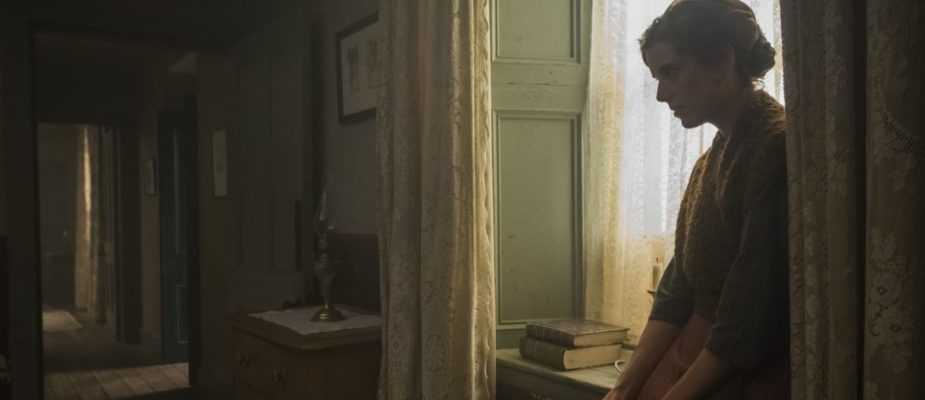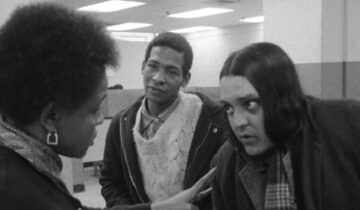Among a certain set of obsessive film-goers–for whom movies are always an art, above all–there seems to be a gathering consensus that Terence Davies is Britain’s greatest living filmmaker. Of course, there were some who were ready to make the claim on the basis of his first two features, the masterpieces Distant Voices, Still Lives (1988) and The Long Day Closes (1992); and others, not just in the general public, but even among critics, for whom the name Davies (pronounced “Davis” for the American reader) means next to nothing. But for those who have been paying attention, and who honestly or reflexively assumed that the title belonged to Mike Leigh, Ridley Scott or whomever else, it’s hard not to be swayed by the evidence of Davies’s somewhat improbable past half decade of major achievements–one that began with The Deep Blue Sea (2011), and now continues with Sunset Song (2015) and the superlative Berlin Film Festival premiere, A Quiet Passion (2016).
The argument for Davies, and it has been an argument that has indeed, for this writer, born scrutiny since his earliest work, is one that is built on a recognition of the value of personal, confessional art. Davies’s art is the most conspicuously personal and nakedly emotional of anyone working in the British cinema today. Beginning with his moving trio of short films that collectively comprise the “Terence Davies trilogy”–Children (1976), Madonna and Child (1980), and Death and Transfiguration (1983)–and continuing through Distant Voices… and The Long Day Closes, Davies created a fictional universe that seemed to obviously double his lived experience: of a sensitive child who clung to his mother’s apron strings and cowered in fear from an abusive father; of a young man who suffered for his homosexuality; and for an Englishman who was born to a tightly-knit, working class culture that was best expressed through multi-generational torch-song sing-along’s performed at the local pub. Davies, born in 1945, is somehow the last of the pre-rock & roll filmmakers, a title that he has earned through his own anachronistic approach to popular culture, and one that he proudly promotes in his personal essay Of Time and the City (2008).
Even in those films that do not seem to directly tell Davies’s story, such as the wonderful Sunset Song, there still is no mistaking not just his style and personality, but also his internal life and emotional experience. A longtime passion project of the director, Sunset Song, based on the 1932 literary classic of the same name, tells the story of Chris Guthrie (Agyness Deyn), a pretty, courteous, and razor-sharp young woman who finds herself torn between her Scottish homeland and the more cosmopolitan England to the South. She is the star French pupil in her class, and spends her nights reading by candlelight in her country home.
Of course, in keeping with the iconography of Davies’s cinema, hers is a home life that is beset by fear of an abusive, alcoholic father, played with bestial ferocity by Scottish actor Peter Mullan (My Name is Joe, Top of the Lake). At first it is her bullied brother and long-suffering mother who find themselves more the object of his animalistic passions and hatreds; however, when both extricate themselves from the picture, it is Chris whom the film’s patriarch will terrorize–even after he suffers a stroke. Suffering will be Chris’s lot in this, the director’s most tragic effort (Mizoguchian even, in its expression of female suffering and the immutability of fate) since 2000’s outstanding The House of Mirth.
Then again, there are “lovely things” in Sunset Song as well–beginning with the film’s golden, grain-covered Scottish hillsides bathed in lustrous, magic-hour sunlight; cool verdant forests; and glowing, Vermeer-like interiors that prove almost as much the film’s focus as its central heroine. Stylistically, Davies is a master of natural light, to be sure, just as he is a maestro of the glance–whose power is no less than the power of the cinema itself–and the sudden communal outpouring of emotion expressed in a shared melody (perhaps the single most recognizable Daviesian motif). He is also adept and fond of the circular pan, which elegantly witnesses the passage of time, departures and arrivals, all within one single, unbroken take. Lovely things “don’t endure” in the cinema of the great Davies.
This is especially true for love, which Chris does find in the person of Ewan Tavendale (Kevin Guthrie), an honest and earnest young lover who will be changed irredeemably by the experience of the First World War–into the sort of man she imagined died with her father. Positioned on the knife’s edge of modernity, there nonetheless is a timelessness at work in Sunset Song, which again is nothing so much as a platform for the director’s emotional confessions. As always we sense Davies behind every feeling and detail, both the sadness that is in some respects the director’s signature, and also the gleam of hope that follows the film’s jarring penultimate shift in perspective.
Of this last, late move, suffice it to say in closing that Sunset Song, like its heroine, manages finally to empathize with the war-ruined Ewan–while Davies also discovers the smallest hint of visual beauty amid the ugliness of the trenches. Amid all the pain, Davies and his lead do not shy away from the hard work of understanding.
***
Sunset Song screens Friday, May 27 & Saturday, May 28 at 5:30 & 8 pm and Sunday, May 29 at 2 & 5:30 pm. For more information or to buy tickets, click here.










